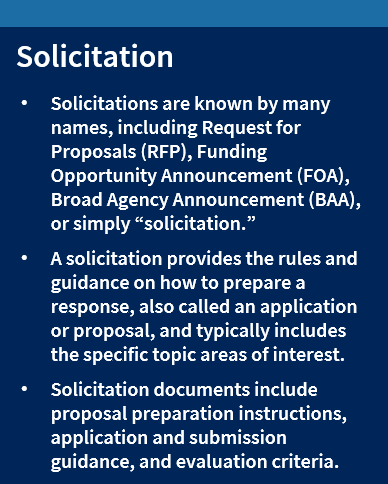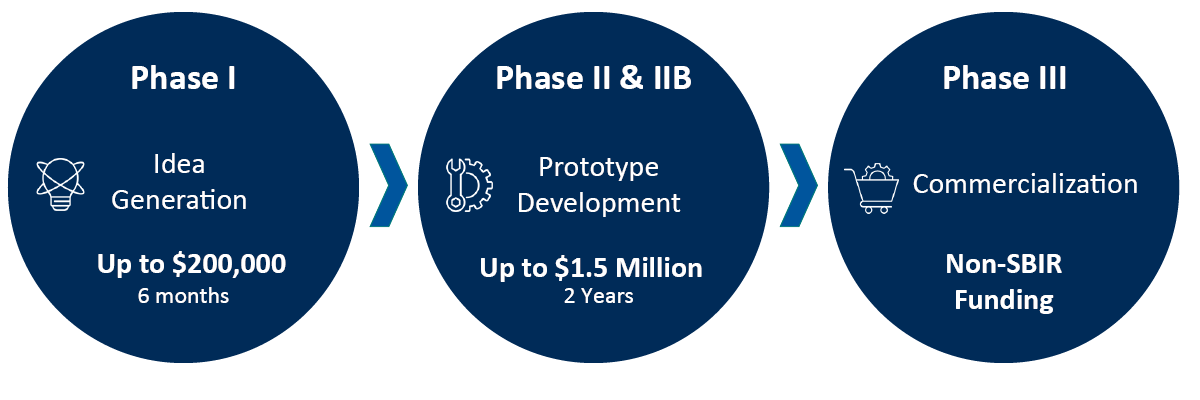About U.S. DOT’s SBIR Program
Program Overview
The U.S. Department of Transportation’s (U.S. DOT) highly competitive Small Business Innovation Research (SBIR) program awards over $10 million annually in contracts to U.S. small businesses to pursue research on and develop innovative solutions to our nation’s transportation challenges.
Referred to as America’s Seed Fund, the SBIR program encourages domestic small businesses to engage in federal research/research and development (R/R&D) that has the potential for commercialization. Through a competitive awards-based program, SBIR enables small businesses to explore their technological potential and provides the incentive to profit from its commercialization.
Small businesses that participate in U.S. DOT’s SBIR program have developed numerous new and innovative technologies that have benefited the Department and the public while providing a basis for growth for small businesses.
- Learn about SBIR funding opportunities
- Review our past solicitations and awardees
- Check out our SBIR success stories
- Get answers to frequently asked questions
- For those seeking funding outside of U.S. DOT’s SBIR program, see Additional Resources for Small Businesses
How It Works
 U.S. DOT issues annual solicitations—typically in the winter—for Phase I research proposals, with subsequent opportunities for follow-on Phase II, Phase IIB, and Phase III awards.
U.S. DOT issues annual solicitations—typically in the winter—for Phase I research proposals, with subsequent opportunities for follow-on Phase II, Phase IIB, and Phase III awards.
Offer Submission
During an open solicitation, United States small businesses can apply for Phase I funding by submitting an offer for U.S. DOT’s consideration.
All proposals must respond to a specific topic in an open solicitation to be considered for an award; U.S. DOT does not consider unsolicited offers.
U.S. DOT notifies applicants of their award status via a secure system within 90 days of the solicitation close.
Selection Criteria
U.S. DOT evaluators review offers and make selections based on best value to the Government, considering the following criteria:
- Technical merit and feasibility
- Experience, qualifications, and facilities
- Effectiveness of proposed work plan
- Commercial potential
- Offer quality
The U.S. DOT SBIR program favors research that has the potential for commercialization through products and applications sold to the private sector transportation industry, state departments of transportation, or other public or private entities.
Award Progression
The U.S. DOT SBIR program primarily awards contracts in two key phases: Phase I and Phase II/IIB. Phase III awards may be considered when funding is available.

Phase I
The objective of Phase I is to establish the technical merit, feasibility, and commercial potential of the proposed technology.
SBIR Phase I awards will not exceed $200,000 and are based on the topic’s funding level stated in the solicitation. The period of performance may be up to 6 months.
Phase II & IIB
The objective of Phase II, and subsequent Phase II awards referred to as Phase IIB, is to continue the R/R&D efforts initiated in Phase I, with a goal of developing and commercializing the Phase I technologies. Phase II/IIB contracts are available only to small businesses that have successfully completed Phase I.
SBIR Phase II/IIB awards typically do not exceed $1,500,000 for 2 years.
Phase III
The objective of Phase III is for small businesses to pursue commercialization objectives resulting from Phase I and Phase II/IIB R/R&D activities.
The SBIR program does not fund Phase III through set-aside funding and must use other available funding.

